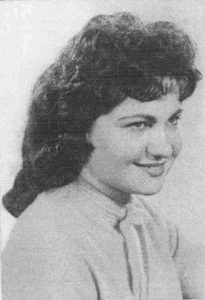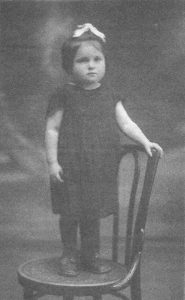Elena and Vincas Jokubaitises
By Rosalyn "Reisele"Kirkel
I was born April 13, 1941, in Šiauliai, Lithuania (Shavli, Lita). On June 22, 1941, Germany occupied Lithuania. The Nazis arrived in Šiauliai on June, 26th.
By August 20th two ghettos were established – Ežero-Trakų, the larger one, and Kaukazas the smaller one. My family including, mother Frida, father Avrom (Abraham), older sister and brother, Leja and Leiba, moved into the smaller ghetto, Kaukazas. When Kaukazas was liquidated September/October of 1943, we moved into Ežero-Trakų Ghetto.
November 5, 1943, the "Kinderaktion" took place when about 760 children and old people were taken to their deaths – my brother Leiba among them. To this day, Šiauliai survivors I have spoken with do not know where they were taken, although some swear it was to Auschwitz.
After "Black Friday," ("Kinderaktion") my mother sought out Bella Janušauskienė, a ghetto acquaintance with Lithuanian in-laws who had successfully smuggled out her own little girl, Hanna. She beseeched her to help save "my little Reisele," just two and a half years old.
Bella arranged it. Her father in-law's sister, Elena and her husband Vincas agreed to hide me. The Jokubaitises were devout Catholics who had no children; They understood the dangers – the risk to their own lives hiding a Jewish child. They agreed, if my parents survived they would return me to them; should my parents not survive, they would have a child to raise as their own.
In the ghetto, Bella worked in Frenkel's Leather Factory, located at one end of Trakų Ghetto. On her way to work that November morning, she carried me under her coat and successfully smuggled me out of the ghetto. Risking her life, she saved mine. Out on the street at the near-by agreed-upon location she handed me over to Elena Jokubaitienė who stood waiting with Ona Janušauskienė, Bella's mother in-law. The women hurried off to Elena's little house at 13 Radviliškio Street, on the out-skirts of town near the airport.
The Jokubaitises took me into their home, and into their hearts. They gave me love and cared for me like their own. They called me "Zulita" and baptized. Careful as they had to be, there were times I played with Bella’s daughter Hanna, two years older than me.
Bella escaped from the ghetto at the time of the liquidation, July 1944. Her Lithuanian in-laws helped her. Her husband, who had served in the Russian army had been killed. She married Menashe Galperin (in the ghetto), with whom she would have two children. Under Communist rule they were not permitted to emigrate from Lithuania until 1972, when they immigrated to Israel; in 1990 to the United States.
At the time of the ghetto liquidation, my father, mother and sister were at first sent to Stutthof in Danzig, Germany. Then on July 26th, after a selection of mothers and children under 15, my mother and sister were sent to Auschwitz to their deaths. Six weeks later, on September 15th my father was sent to Anfing, near Dachau, to work as a barber.
He was liberated by the Americans in the town of Tutzing, near the end of April, 1945, while on a death march toward the Austrian Alps. The Nazis had planned to blow them up but the Americans intercepted.
Very weak and sick my father was at first hospitalized, then sent to Feldafing DP Camp to regain his strength. He did not know if I was dead or alive, but was strong enough by the end of 1945 to return to Lithuania to find me. Travel was still dangerous for Jews, especially travelling illegally – with false papers which he needed.
In February of 1946, he arrived in Šiauliai and found his cousin Rochel Kirkel Verkel with whom he stayed. Only Bella knew where I was, and she assured him that I was alive and well-taken care of. But Elena Jokubaitienė loved me and would be reluctant to return me to him. As an illegal he could not seek help from the authorities. Bella recommended that he take along Yona Rosenfeld, an officer with the NKVD.
Once my father explained the situation, Rosenfeld agreed to help and included his brother Yitzchak, who was on leave in Šiauliai. The two brothers armed and in uniform, along with my father, walked the distance to the home of the Jokubaitises on that wintry February day.
I did not recognize the stranger who said he was my father – he had come the day before. I was nearly five years old and had not seen him for two and a half years. I held my "mama" tight, screamed and cried. Jokubaitienė handed over my baptism paper to Rosenfeld. In the commotion neighbors began to gather. "Take the girl!" Rosenfeld told my father. My father handed Jokubaitienė some money. Outside, Rosenfeld hailed a military vehicle which then dropped my father and me off in town.
After a six week stay in Vilna where my father got false papers, we started our journey back. We arrived in the Feldafing DP Camp in May. I refused to take off the cross around my neck. I WAs a traumatized child. I was withdrawn. It would take time for me to bond with my father.
It was three years before America opened her doors to us. On June 3, 1949 we disembarked from the ship in Boston – my father, my step-mother, Sarah and me. From there, we took the train to Columbus, Ohio, where our American cousins waited for us and we began a new life.
My father was very grateful to the Jokubaitises: they risked their lives to save me, I was all he had left from the horror. He understood how they loved me too and would have liked to keep me.
From the beginning he corresponded with them. He sent packages, medication, and photographs through the years. He offered to help them immigrate to America.
Before my father died in February, 1977, he told me this story. Unfortunately, it was years later that I began to research my history in greater depth. Only then did I have more questions, but he was gone. I reached a level of maturity and began to tell my story as a professional storyteller – a child survivor.
Perhaps psychologically I had blocked it out – too painful. I am so sorry; it is my loss. How I would have liked to meet Elena Jokubaitienė as an adult. She never forgot me until her death in 1979, Vincas died in 1954. The Jokubaitises left no descendents. It would give me great satisfaction were I able to show them the deep gratitude that I feel.
In 1999 the International Federation of Child Holocaust Survivors held their annual conference in Prague. I decided that if I attend, I must return to the city of my birth – Šiauliai, Lithuania. I was imbued with a passionate interest in the life of my family, the life of my people in Lithuania.



